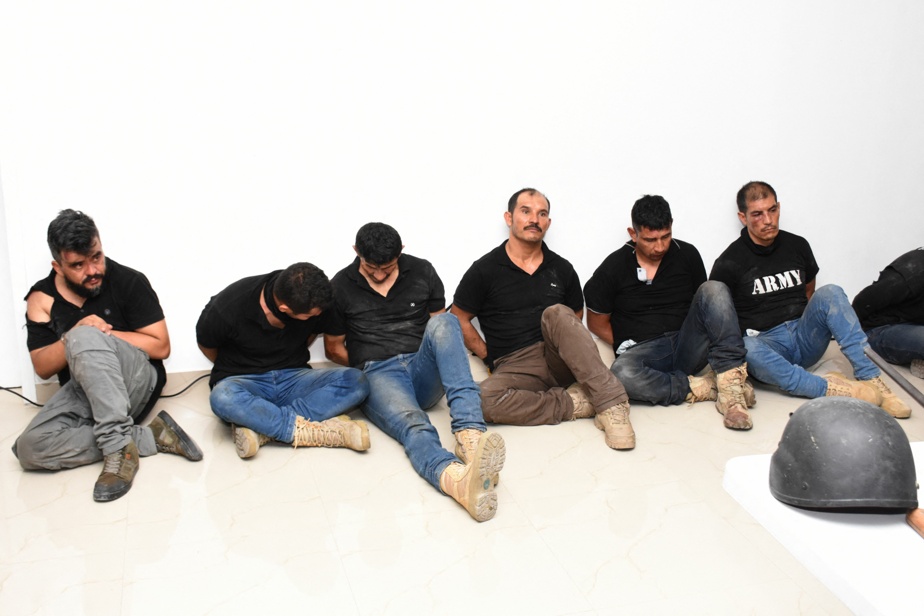(Port-au-Prince) Investigations continued in Port-au-Prince Friday into the assassination of Haitian President Jovenel Moise, adding to the mystery over the identity of the shepherds who sent the armed commando of 28 attackers, consisting of 26 Colombians and a Colombian. American people of Haitian descent.
Robenson GEFFRARD with Daxia ROJAS in Washington and Amelie Barron in Paris France media agency
The country’s police said Thursday evening during a press conference, that 17 people, including 15 Colombians and two Americans, were arrested for their involvement in the killing of President Moyes, which was riddled with bullets at his home on the night of Tuesday to Wednesday.
Photo: Andres Martinez Casares, Reuters archive
Haitian President Jovenel Moise
Leon Charles, director general of the Haitian Police, said that three Colombians accused of being members of the commandos were killed by the police, while eight others are still at large, although the results differed slightly according to other official sources.
Weapons and equipment allegedly used by the attackers, including machetes, laptops and Colombian passports, were recovered by police and shown to the press, with several suspects lined up against a wall and handcuffed.
Colombian Defense Minister Diego Molano announced Thursday evening in a videotape sent to the media, that it is believed that at least six of the commando mercenaries are former Colombian soldiers.
According to information from Interpol, it will be “two retired non-commissioned officers from the army” and “four former soldiers” from the Colombian army, said General Jorge Vargas, director of the national police. Two of them were said to have been among the attackers killed by the police.
Taipei said on Friday that 11 suspects had been detained at the Taiwanese embassy compound in Port-au-Prince.
Photo by Joseph Audelin, Associated Press
Security guards in front of the Taiwanese embassy in Port-au-Prince
The US State Department, without confirming the arrest of US citizens, claimed that it had agreed to assist the Haitian police in their investigations.
“We should know”
Paralyzed for several days, the Haitian capital timidly resumed its activities on Friday morning, more people took to the streets and public transport gradually resumed services, witnesses said.
The reopening of Port-au-Prince airport, at the request of the government on Thursday, should take effect on Friday.
However, in the country, everyone remained vigilant, trying to understand how such a fatal attack on the head of state could happen.
These are foreigners who came to this country to commit this crime. “We Haitians are terrified,” a resident of the capital told AFP. “We need to know who is behind all this, their names and their background for justice to do its work,” he added.
The Chief Public Prosecutor in Port-au-Prince announced Thursday that senior police officials, directly responsible for the Haitian president’s security, are in the hot seat in particular and have been summoned to court.e Ford claude bed.
I didn’t see any police victim except for the president and his wife. If you were responsible for the president’s security, where were you? What did you do to avoid this fate of the president? ‘ asked the metropolitan government commissioner.
Others even questioned the possible involvement of these police officers, adding to the confusion.
“President of the Republic Jovenel Moise was assassinated by his security agents. It was not the Colombians who killed him. Former Senator Stephen Benoit said on the radio on Friday that the latter were contractors with the Haitian state.”
political chaos
This attack further destabilizes the poorest and most insecure country in the Americas.
Two men currently claim to lead the country of 11 million people, more than half of whom are under the age of 20.
One of Jovenel Moise’s recent policy initiatives, who died at 53, was the appointment of another prime minister, Ariel Henry, on Monday. He had not taken office after the time of the assassination.
A few hours after the tragedy, it was interim Prime Minister Claude Joseph who declared a state of siege for 15 days, granting enhanced powers to the executive branch.
Reuters photo
Interim Prime Minister Claude Joseph
If the opposition accused Mr. Joseph of monopolizing power, the UN envoy to Haiti, Helen Lyme, considered him to be the responsible authority because Ariel Henry was not sworn in.
One of the articles of Haiti’s constitution already states that in the event of a vacancy in the office of the presidency, “the Council of Ministers, headed by the Prime Minister, exercises executive power until the election of another president.”
The country has already sunk into an institutional crisis: Jovenel Moyes has not held elections since coming to power in early 2017 and the country has not had a parliament since January 2020.

